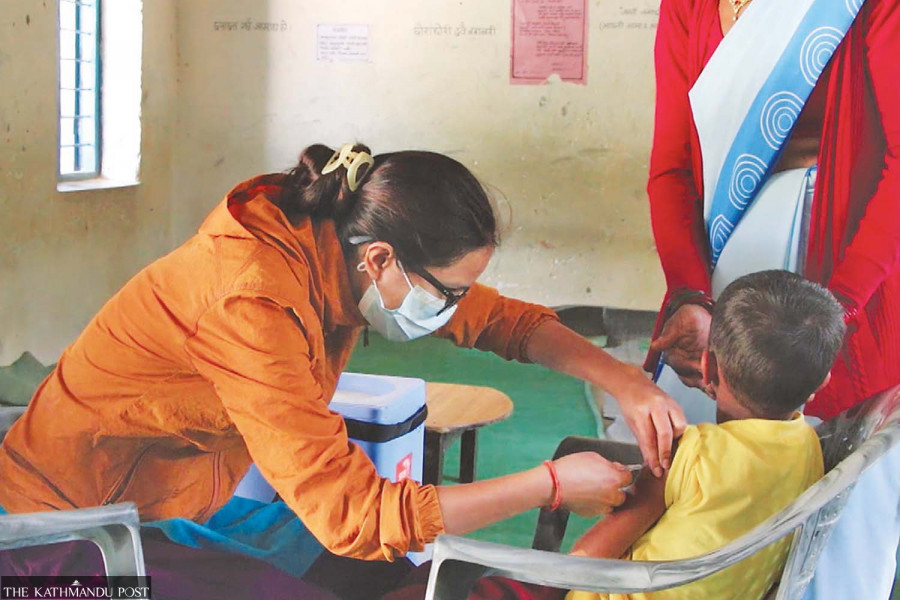Health
Measles-rubella vaccination to start soon in around 160 local units
Vaccination has been delayed due to cold and snowfall. Around 4 million children throughout the country are inoculated with MR vaccine in the ongoing campaign.
Post Report
Children between nine to 59 months from 160 local levels in mountainous districts will be inoculated with the measles-rubella vaccine, as concerned health agencies have been preparing to start the vaccination drive against the disease.
Due to snowfall and cold, health workers serving in several mountainous districts have delayed the campaign, officials said.
“A lot of children from mountainous districts have migrated to other places to escape the cold,” said Dr Abhiyan Gautam, chief of the Immunisation Section at the Family Welfare Division under the Department of Health Services. “But with the temperature starting to rise, many people have returned to their homes, and health workers too have started preparation to administer the vaccine doses.”
Around 4 million children have been inoculated in the ongoing MR campaign started on February 25, officials said. The Health Ministry has planned to inoculate around 5.7 million children from 75 districts in the three-week-long campaign.
“Vaccination campaigns have been running smoothly throughout the country,” Gautam said. “Preparations are underway to start the drive in the places, especially in villages of the mountainous region, where the programme has been delayed due to cold and snow.”
Children between nine months and 15 years from 24 high-risk districts (21 districts bordering India and three from the Kathmandu Valley—Kathmandu,Lalitpur and Bhaktapur) have been jabbed with the measles-rubella vaccine in the campaign. Those between nine months and five years from 51 districts were administered with the vaccine.
Health Ministry officials say that the vaccination has been completed in 413 local levels of 24 districts. They say that no issue of adverse post-vaccination side effects has been reported as of Monday evening.
Officials said that health workers have been alerted to track children of migrant populations and those residing in the city slums and remote areas, who could miss the vaccine in the ongoing drive.
Nepal had committed to eliminating measles by 2023 after missing the earlier deadline of 2019. To declare measles as eliminated, the number of cases should be less than five per 1 million people throughout the year.
However, the deadly virus was reported in over 14 districts of the country at the start of 2023. At least one child died and hundreds were infected with the disease last year.
The campaign has been already completed in Jajarkot and Rukum West, the two districts worst hit by the magnitude 6.4 earthquake on November 3.
The health ministry launches a nationwide measles-rubella campaign every four years to cover the children who missed the vaccine doses in the routine programme. Every year, thousands of children miss the vaccine doses, as the coverage rate of the measles-rubella vaccine is below 90 percent.
A coverage rate of over 95 percent is required for the disease to be eliminated, according to experts.
Measles and rubella are contagious viral diseases transmitted through droplets from the nose, mouth or throat of an infected person. Early symptoms, which usually appear 10 to 12 days after infection, include high fever, runny nose, bloodshot eyes and tiny white spots in the mouth. Several days later, rashes develop on the face, upper neck and other body parts.
Measles was once endemic in Nepal, with an average 90,000 cases reported annually from 1994 to 2004.
The government introduced a routine measles vaccination programme in the country in the late 1980s.
Although Nepal had committed to eliminating measles by 2019, the deadline was extended to 2023 due to frequent occurrences of the disease.
The ministry has now extended the deadline for measles elimination to 2026.




 14.12°C Kathmandu
14.12°C Kathmandu














